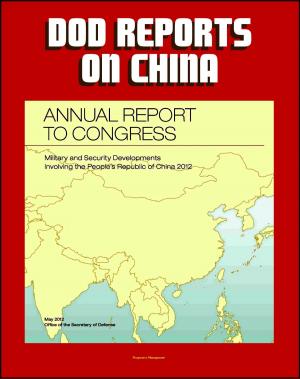Cryptocurrency and State Sovereignty: Comprehensive Review of Bitcoin, Blockchain, and Virtual Currency Technology, Hash Functions, Merkle Trees, and Security, Government Bans and Regulations
Business & Finance, Economics, Money & Monetary Policy, Nonfiction, Computers, Networking & Communications, Computer Security, Operating Systems| Author: | Progressive Management | ISBN: | 9780463341223 |
| Publisher: | Progressive Management | Publication: | September 5, 2018 |
| Imprint: | Smashwords Edition | Language: | English |
| Author: | Progressive Management |
| ISBN: | 9780463341223 |
| Publisher: | Progressive Management |
| Publication: | September 5, 2018 |
| Imprint: | Smashwords Edition |
| Language: | English |
This mid-2018 report has been professionally converted for accurate flowing-text e-book format reproduction. Since Bitcoin's release in late 2008, the cryptocurrency has grown and proven itself as a disruptive technology, resistant to sovereign law and international financial regulations, and an alternative to the sovereign state's concept of fiat money. The Wild West nature of cryptocurrency has enabled a number of individuals, criminal organizations, terrorist groups, and sovereign states to use Bitcoin, among other cryptocurrencies, to avoid detection, interference, or punishment from regulatory agencies to commit actions such as money laundering, trafficking narcotics, purchasing weapons, and bypassing international sanctions. This study addresses the disruptive nature of cryptocurrency by asking what legislative options are available to sovereign states to maximize the effectiveness of sovereign laws while limiting undesired cryptocurrency use. To tackle this question, this study breaks down the legislative actions countries may take into three categories—prohibition, regulation, and adoption—to investigate the benefits, limitations, and effects of each policy. By examining the legislative actions of countries like China, the United States, and Russia, this study finds that sovereign states have had limited success in preventing illicit cryptocurrency use; however, without implementing a refined, multifaceted global regulatory standard on cryptocurrency transactions in the near future, cryptocurrency will remain an unchecked means to transact on an international scale.
The questions in this study are built upon the premise that cryptocurrencies offer new and unprecedented challenges to sovereign states' ability to regulate and enforce laws governing its monetary policy, security, and trade; therefore, the state—and by extension the international community—will endeavor to develop policies to increase sovereign states' control on the use of cryptocurrency. The questions this study seeks to answer are: What options are available to the sovereign state to limit cryptocurrency' s capacity to challenge domestic and international laws? What allows cryptocurrency to sidestep the established financial order and enforcement institutions? What are the challenges sovereign states face when introducing cryptocurrency legislation? Finally, as cryptocurrency technology becomes more popular and countries begin developing their own blockchain-based tools, what factors will inhibit or promote a sovereign state from developing their own sovereign cryptocurrency?
The first chapter of this study consists of the study question and its importance, the literature review, and chapter outline. The second chapter is dedicated to describing the functionality of cryptocurrency, including the innovative technology that makes it an attractive method of transaction. Also, this chapter dissects blockchain technology into its key parts as a means to present the advantages, disadvantages and weaknesses inherent in blockchain based cryptocurrency. It is this study's goal to analyze the potential impact that cryptocurrency has on the state's sovereignty and they methods the state and international institutions could take to manage cryptocurrency implementation. To do this, this study divides the potential actions a state may take into the last three chapters, Chapter III Banning Cryptocurrency, Chapter IV Regulating Cryptocurrency, and Chapter V Adopting Cryptocurrency. Chapter III focuses on listing the potential methods that states may take to regulate cryptocurrency and analyzes each method's effectiveness. Chapter IV lists and analyzes how different levels of a ban on cryptocurrency could affect a state's capability to prevent illicit activity and the consequences resulting from extreme measures.
This mid-2018 report has been professionally converted for accurate flowing-text e-book format reproduction. Since Bitcoin's release in late 2008, the cryptocurrency has grown and proven itself as a disruptive technology, resistant to sovereign law and international financial regulations, and an alternative to the sovereign state's concept of fiat money. The Wild West nature of cryptocurrency has enabled a number of individuals, criminal organizations, terrorist groups, and sovereign states to use Bitcoin, among other cryptocurrencies, to avoid detection, interference, or punishment from regulatory agencies to commit actions such as money laundering, trafficking narcotics, purchasing weapons, and bypassing international sanctions. This study addresses the disruptive nature of cryptocurrency by asking what legislative options are available to sovereign states to maximize the effectiveness of sovereign laws while limiting undesired cryptocurrency use. To tackle this question, this study breaks down the legislative actions countries may take into three categories—prohibition, regulation, and adoption—to investigate the benefits, limitations, and effects of each policy. By examining the legislative actions of countries like China, the United States, and Russia, this study finds that sovereign states have had limited success in preventing illicit cryptocurrency use; however, without implementing a refined, multifaceted global regulatory standard on cryptocurrency transactions in the near future, cryptocurrency will remain an unchecked means to transact on an international scale.
The questions in this study are built upon the premise that cryptocurrencies offer new and unprecedented challenges to sovereign states' ability to regulate and enforce laws governing its monetary policy, security, and trade; therefore, the state—and by extension the international community—will endeavor to develop policies to increase sovereign states' control on the use of cryptocurrency. The questions this study seeks to answer are: What options are available to the sovereign state to limit cryptocurrency' s capacity to challenge domestic and international laws? What allows cryptocurrency to sidestep the established financial order and enforcement institutions? What are the challenges sovereign states face when introducing cryptocurrency legislation? Finally, as cryptocurrency technology becomes more popular and countries begin developing their own blockchain-based tools, what factors will inhibit or promote a sovereign state from developing their own sovereign cryptocurrency?
The first chapter of this study consists of the study question and its importance, the literature review, and chapter outline. The second chapter is dedicated to describing the functionality of cryptocurrency, including the innovative technology that makes it an attractive method of transaction. Also, this chapter dissects blockchain technology into its key parts as a means to present the advantages, disadvantages and weaknesses inherent in blockchain based cryptocurrency. It is this study's goal to analyze the potential impact that cryptocurrency has on the state's sovereignty and they methods the state and international institutions could take to manage cryptocurrency implementation. To do this, this study divides the potential actions a state may take into the last three chapters, Chapter III Banning Cryptocurrency, Chapter IV Regulating Cryptocurrency, and Chapter V Adopting Cryptocurrency. Chapter III focuses on listing the potential methods that states may take to regulate cryptocurrency and analyzes each method's effectiveness. Chapter IV lists and analyzes how different levels of a ban on cryptocurrency could affect a state's capability to prevent illicit activity and the consequences resulting from extreme measures.















